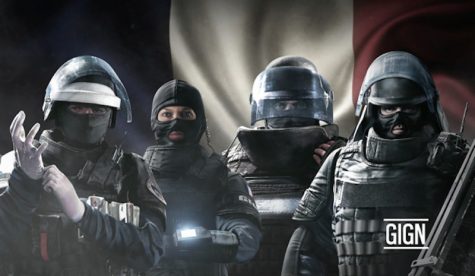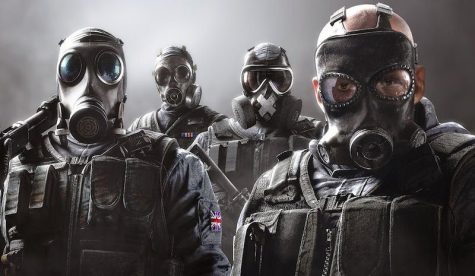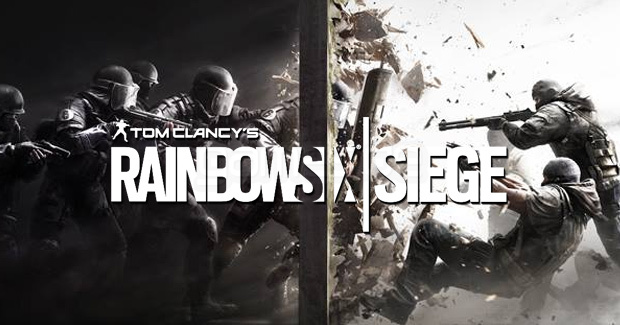Ubisoft succeeds with Rainbow Six: Siege Closed Beta
Ubisoft tries to amend its history of unfinished games by hosting a closed beta test of their upcoming tactical shooter
October 9, 2015
photo via wikimedia.org under Creative Commons license
Tom Clancy’s Rainbow Six: Siege is the new revival of the tactical shooter genre.
An exchange of gunfire ends and the quiet whisper of charging handles ensues. Without any warning, the deafening sound of rounds slicing through paper-thin walls and shell casings hitting the floor began simultaneously from both sides, as if a conductor gave a cue to an orchestra.
“Grenade, take co—” He never finishes that thought. The operator’s body flies through the air like a ragdoll, with metal fragments from the explosion hitting every surface — smashing windows, damaging walls, creates holes in the floor. A loud, high-pitched noise rings in my ears — tinnitus. The Commanding Officer radios in, “three Blue Four members remaining.”After the ringing stops I realize that the entire room is silent. I quietly radio in for the rest of the team to follow me.
I push forward, shield in one hand and a pistol in the other. Two other operators follow my lead, taking cover behind my shield. We crouch behind a kitchen counter and silently move along. This used to be a home of a family. Now it’s a war zone.
I see dark figures make a run to a bedroom. I drop my shield and unload my entire magazine into the general direction of the two silhouettes. They fall and slide across the floor as if I hit an off switch. “Blue Four victorious; hostiles eliminated,” buzzes the radio. That was an ordinary match of Tom Clancy’s Rainbow Six: Siege, developed by Ubisoft, by far one of the most realistic shooters of the year.

One of the combat units featured in Rainbow Six: Siege is the National Gendarmerie Intervention Group (GIGN) created in 1973. The group specializes in counter-terrorist and rescue missions. Having taken part in over 1000 operations, since the GIGN was founded the unit has only seen 9 fatalities.
When I first played Rainbow Six: Siege this past month, the game was not officially released yet. I had reserved an access key to the closed beta testing of the game, which started on Sept. 24. This beta testing allowed for players to get a taste of the game and report issues to the developers who can identify said issues and fix them before the official launch.
Testing is a major part of the development process of any product, as “even the cheapest animated show costs fourteen, thirty, forty million dollars — it’s a huge investment on an idea you think is great,” said animation teacher John Over. “So what you do is you hire a focus group firm to receive feedback from your target audience. They answer questions like ‘Did you feel that the main character was likable?’ or ‘What did you dislike?’” In the case of Tom Clancy’s Rainbow Six: Siege, game keys were provided through multiple company giveaways using a first-come, first-served system. Over explained how this option allows for bias in the product screening, “You don’t want to skew it with a fan base… If fans had their way, the [product] would be too off-putting for the general public.”
Mathematics and computer science teacher Fred Blattner recalled his education in programming and bug fixing. “Our programs that we had to write at school to pass classes were nowhere near as complex as something like a video game,” Blattner said. “It was easier to find bugs as there were fewer opportunities to find bugs. The hope [today] is that by beta testing, because there are so many people testing the program, [the developers] will be able to find all the easy-to-fix bugs immediately and eliminate them and if any others remain nobody would find them.”
As can be seen throughout Ubisoft’s history, the company has failed to provide any hint of even minimal quality control, with the game Assassin’s Creed Unity constantly crashing and having lackluster performance issues. In fact, the game was deemed to be a “buggy and horrendous and evidently unpolished” by the critic John Bain.
I prepared myself for frustration when I received the access code through email. At that very moment I realized that I had to use uPlay to download, install and launch the game. uPlay is a Digital Rights Management service, or DRM, designed to constantly keep track of whether a user is a rightful owner of the program. Complaints against DRM have increased over time, with a video game development company CD Projekt Red outright refusing to use any sort of copyright protection, saying, “We don’t want to assault anyone.”
“[DRM] doesn’t protect, not really,” said the Director of Public Relations at CD Projekt Red, Michał Platkow-Gilewski. “Games are cracked in minutes, hours, or days but they’re always cracked. If you want to pirate you’ll find a way. But if you’re a committed gamer and are buying the game why should we place a barrier on you?”
uPlay is notorious for being one of the most buggy forms of copyright protection. In fact, upon release of another Ubisoft game entitled Watch Dogs, the game’s forum was “heavily top-loaded with complaints” about uPlay preventing users from playing and even caused over a thousand fans to petition the removal of uPlay.
Surprisingly, uPlay was not the complete failure that I was expecting it to be and neither was the game. Of course, Rainbow Six: Siege had its fair share of problem; however, none of these issues was as major as crashes or poor performance. I was amazed — near-complete game in an unfinished state of game development is an oxymoron. I thought to myself whether this was all a marketing ploy by Ubisoft. I was incorrect.
The issues began about an hour or two into the game. The Rainbow Six: Siege features classes for players to pick. Each one of them has to be unlocked and have their own advantages and disadvantages. This is meant to balance players to force each other to work as a team. Problem was that, for no apparent reason, my mouse and keyboard did not affect the screen when I was trying to select a class. It wasn’t frozen, I could see people picking different classes and weapons, but I was not able to create a selection. Another bug I encountered was when I tried to use the chat menu. What I typed just wouldn’t show up. Once I pressed enter, the message was sent just fine but I was actually unable to see what I wrote before I sent it.
I have also had some minor issues with connectivity. Servers kept on cutting me out, I’m assuming due to the massive amount of players trying to play the game. I quit trying after about five disconnections and came back to play outside of the rush hour, it worked fine then. Another problem, which was not tied to the gameplay, was that the in-game text kept referring to magazines as clips, which is a common misconception that definitely should not exist in a game under Tom Clancy’s name.
Junior Anthony Cragnotti ran into far more issues than I have in the beta. “The bugs, oh my,” he said. “Walking through walls, vans, windows, clipping into them and shooting out but not being able to be hit.” Cragnotti described how scouting drones at times “would fall through the map, guns wouldn’t shoot and characters would stop working.”

Founded in 1941, the Special Air Service was a unit in the British Army during WWII. The SAS moved from obscurity in 1980 when they successfully rescued hostages from the Iranian Embassy siege. Their focus is counter terrorism, hostage rescues and covert operations.
Cragnotti added that, despite these issues, Tom Clancy’s Rainbow Six: Siege Closed Beta was “one of the best betas” he had ever played. I agree, as these bugs are not massive game-breaking problems that require a complete overhaul and can be easily fixed in a matter of a month or two, but definitely not by the previous release date, which was Oct. 13. Ubisoft made a smart move by delaying the game until Dec. 1 to make “adjustments and improvements… including improving the co-op experience across all game modes, weapon and gadget balancing, as well as menu and interface navigation.”
Reporting these issues was quite simple. As a beta tester, I had the opportunity to message the support team of Ubisoft to have them relay my problems to the development team. I went to the official website of Rainbow Six: Siege, hit the support button, addressed my issues, attached screenshots and hit the send button. In less than half a day I received an email from Ubisoft, “Thank you for contacting Ubisoft Support. We appreciate you taking the time to report your findings from the Beta. All feedback from the beta will be forwarded to the development team for further investigation… If you have any further questions or issues feel free to contact us again and we will be happy to assist you.”
Despite the recent history, Ubisoft is starting to change their practices. The idea of a free closed beta meant to “test the online infrastructure and matchmaking” is very unusual from Ubisoft, which made me cautious at first but I’ve realized that the company is listening to community feedback for once. “I think that Ubisoft went in the right direction with this beta because I know that based on the interactions they had with the [players of] pre-alpha and alpha tests … they actually listened to their players and made a thread on Reddit telling us what they were going to do with the information that they gathered,” Cragnotti said.
